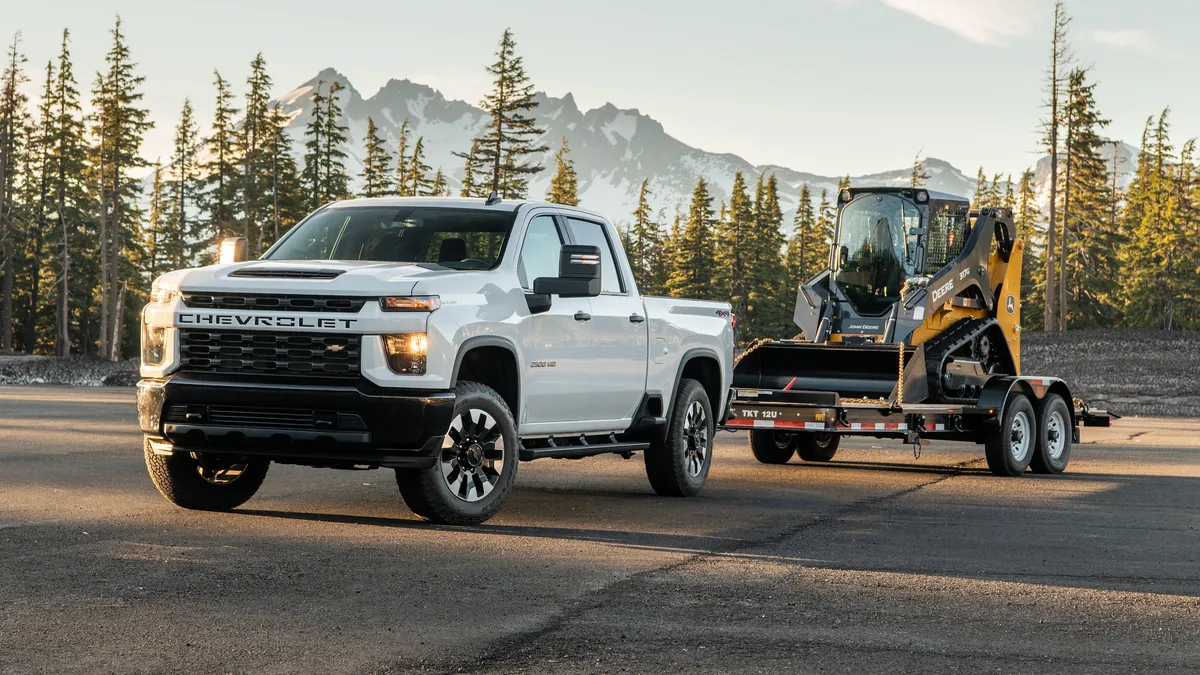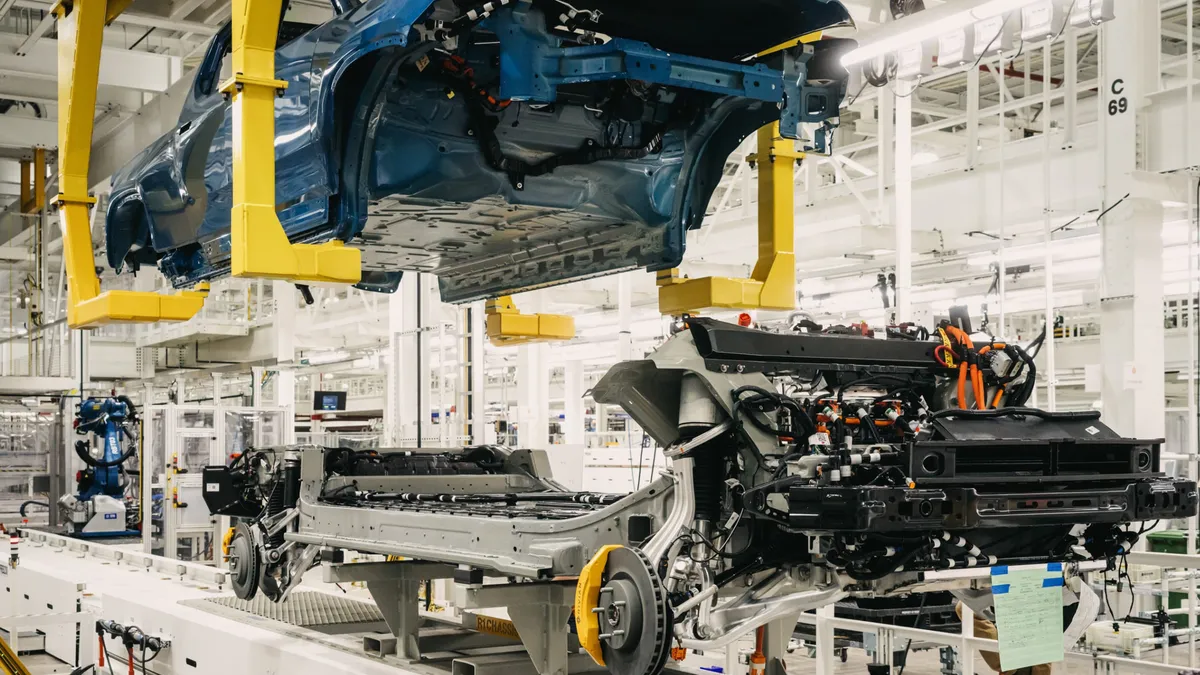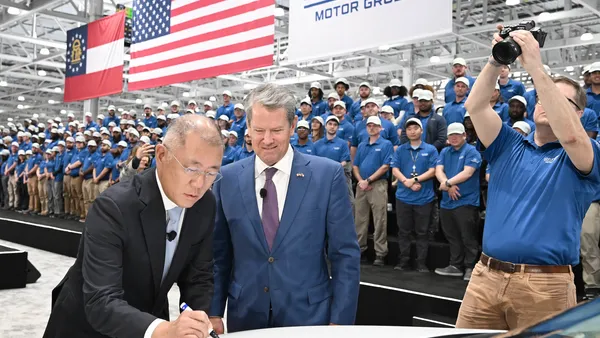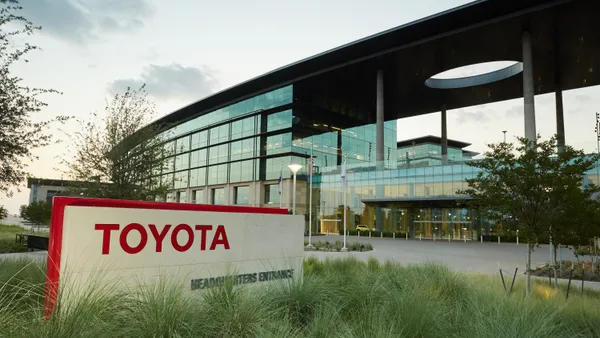Dive Brief:
- General Motors Co. has recalled nearly 462,000 pickups and SUVs equipped with Duramax turbo-diesel engines for transmission control valves that are susceptible to excess wear over time, resulting in harsh shifting, or in rare cases can cause the rear wheels to lock up while driving, according to the National Highway Traffic Safety Administration.
- The recalled vehicles include the 2020-2022 Chevrolet Silverado 1500, 2500, 3500 pickups, 2020-2022 GMC Sierra 1500, 2500, 3500 and 2021 Cadillac Escalade, Escalade ESV, Tahoe, Suburban, GMC Yukon, and Yukon XL SUVs.
- While dealers will update the new transmission control module software in the vehicles for free and provide a warranty coverage program to cover any additional repair costs, replacement parts are currently not available. However, GM is working to obtain the parts as quickly as possible, according to the NHTSA.
Dive Insight:
GM pickups and SUVs equipped with diesel engines use a 10-speed automatic transmission. Similar models equipped with gas engines use a different transmission and are not included in the recall.
The 10-speed transmissions in the recalled vehicles are marketed as “Allison-branded”, but the unit is manufactured by GM, not by Allison Transmission, Branden Harbin, Allison's executive director of global marketing + external communications, wrote in an email to Automotive Dive.
“Allison Transmission has no oversight into the manufacturing process or supply base for the Allison-branded 10-speed transmission,” Harbin said.
The updated control module software will more closely monitor the performance of the transmission control valve. If the software detects excess wear approximately 10,000 miles before a wheel lock up condition may occur, the transmission’s shifting will be limited to fifth gear until the next key cycle.
Excessive wear within the transmission control valve body can cause the fluid pressure to drop and may cause certain shift valves to move unexpectedly. The lockup condition occurs during downshifts from eighth gear, according to the NHTSA report. Drivers may also see a “reduced propulsion” message displayed in the instrument panel.
Due to the potential safety risk of the rear wheels locking up, GM issued its dealers a stop sale order for the recalled vehicles on Oct. 24. In addition, all GM certified used vehicles currently in dealer inventory will be de-certified and held until repairs are completed.
Once a sufficient quantity of replacement parts are available, the recall bulletin will be released and dealers can begin repairing the vehicles, according to the NHTSA report.
GM will begin sending out owner notification letters on Dec. 9.
All 2022 Silverado 1500 and Sierra 1500 pickups produced after March 21, 2022 and 2500 and 3500 Silverado and Sierra models produced after Jan. 11, 2022 use updated transmission control software to better detect excessive wear. A software update for other models was introduced at the start of model year 2022 production.
Recall chronology
GM was notified about the transmission problem on June 5, 2024 after an engineer submitted a report based on a customer complaint to the company’s internal “Speak Up for Safety” program, which allows employees to report any quality or safety-related concerns without the fear of retaliation.
The customer claimed that the rear wheels on a 2021 Sierra 2500 HD pickup locked up while towing a trailer, which resulted in property damage to the vehicle and trailer.
Based on the whistleblower report, GM opened its own investigation on July 16. However, the company was already aware that excessive wear in a control valve in these transmissions was causing harsh downshifting and, in rare cases, a momentary lock up of the rear wheels. GM’s initial testing and analysis determined that the condition was not sufficient to cause a loss of vehicle control, so no recall was issued at the time.
But on July 29, the NHTSA notified GM that its Vehicle Owner's Questionnaire monitoring process had identified additional potential transmission problems. A GM investigator completed an analysis of the NHTSA questionnaires along with a comprehensive field data search on Sept. 17. The investigator identified 1,888 field reports between Jan. 30, 2020, and Aug. 2, 2024, of rear wheel lockups on GM vehicles and potentially related to this condition.
GM also identified 11 other related incidents, including vehicles veering off the roadway resulting in property damage. Three minor injuries were also reported, but none were the result of a crash.
Based on these findings, GM’s Safety Field Action Decision Authority decided to conduct a voluntary safety recall of the vehicles on Oct. 17.
Correction: A previous version of this story incorrectly identified GM's transmission supplier in these recalls.












